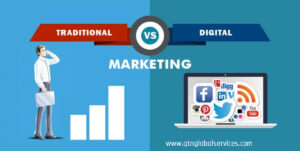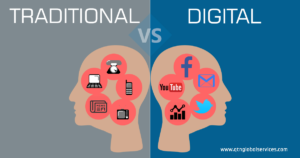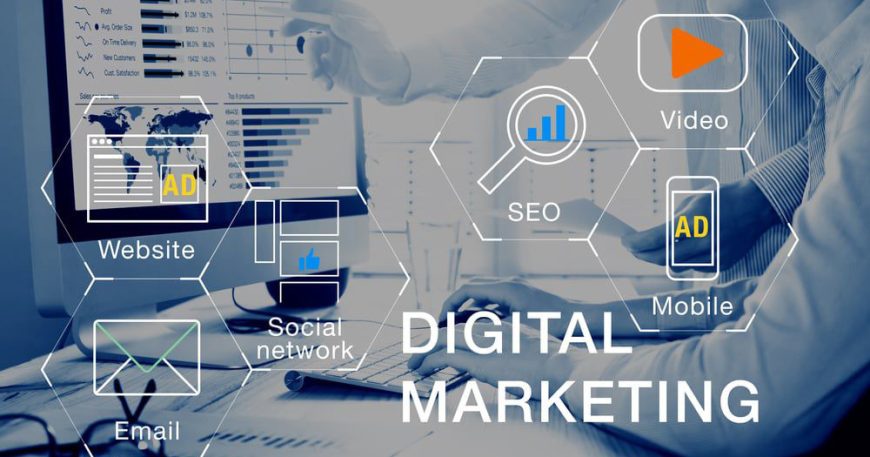In today’s fast-paced world, where technology reigns supreme, the battle between digital marketing and traditional marketing has become a hot topic of debate. With the advent of the internet and the increasing reliance on digital devices, businesses are presented with an array of choices for reaching their target audiences. In this article, we’ll explore the reasons why digital marketing has gained an upper hand over traditional marketing methods.
Table of Contents
- Introduction
- Cost-Efficiency
- Global Reach
- Targeting Precision
- Real-Time Analytics
- Interactivity and Engagement
- Flexibility and Adaptability
- Brand Development
- Measurable Results
- Social Sharing and Virality
- Personalization
- Search Engine Visibility
- Mobile Dominance
- Integration of Multimedia
- Conclusion
- FAQs
Introduction
In an era dominated by screens and smartphones, the shift from traditional marketing to digital marketing is becoming increasingly evident. Businesses are recognizing the vast potential that digital platforms offer for promoting their products and services.

Cost-Efficiency of Traditional & Digital Marketing
One of the primary reasons for the preference of digital marketing is its cost-efficiency. Unlike traditional methods such as television or print ads, digital marketing campaigns can be tailored to fit any budget, making it accessible to businesses of all sizes.
Global Reach
Digital marketing breaks down geographical barriers, allowing businesses to reach a global audience with ease. This level of exposure is nearly impossible with traditional methods, which often have limited reach.
Targeting Precision
Digital marketing provides a remarkable advantage in terms of targeting specific demographics. Through techniques like search engine optimization (SEO) and social media advertising, businesses can ensure their message is delivered to the right people at the right time.
Real-Time Analytics
Gone are the days of waiting for weeks to analyze the effectiveness of a campaign. With digital marketing, real-time analytics enable businesses to track their campaigns’ progress and make instant adjustments for optimal results.
Interactivity and Engagement
Digital marketing fosters interactivity and engagement, allowing businesses to have direct conversations with their customers. Social media platforms, for instance, offer a space for real-time interactions and feedback.
Flexibility and Adaptability
Digital campaigns can be adjusted on the fly, ensuring that businesses stay relevant in a rapidly changing market. This level of flexibility is unmatched by traditional methods that require extensive lead times.
Brand Development
Digital marketing aids in building brand identity. Through consistent online presence, engaging content, and compelling visuals, businesses can create a strong brand image that resonates with their target audience.
Measurable Results
The effectiveness of digital marketing campaigns can be measured with great precision. Metrics like website traffic, conversion rates, and engagement levels provide tangible insights into the success of a campaign.

Social Sharing and Virality
Digital campaigns have the potential to go viral through social media sharing. Engaging and shareable content can quickly spread across platforms, reaching an audience beyond the initial target.
Personalization
Digital marketing enables personalized communication. Businesses can tailor content to individual preferences, enhancing customer experiences and driving higher conversion rates.
Search Engine Visibility
Appearing on search engine results pages is crucial for business success. Digital marketing techniques like SEO enhance a brand’s visibility, making it easier for potential customers to find them online.
Mobile Dominance
With the rise of mobile devices, digital marketing has adapted seamlessly to the mobile landscape. Mobile optimization ensures that businesses can effectively reach customers who use smartphones and tablets.
Integration of Multimedia
Digital marketing allows for the integration of various multimedia formats. From videos to infographics, businesses can diversify their content to capture and retain audience attention.

Conclusion
In the ongoing debate between digital marketing and traditional marketing, the advantages of the former are hard to ignore. With its cost-effectiveness, global reach, and precise targeting, digital marketing has redefined the way businesses connect with their audiences. Embracing the digital realm is not just a choice; it’s a necessity for those who want to thrive in the modern business landscape.
FAQs
- Is digital marketing suitable for all types of businesses? Digital marketing can benefit businesses of various sizes and industries. It offers flexibility and scalability that can be tailored to different needs.
- What is the role of SEO in digital marketing? SEO, or search engine optimization, is crucial for improving a website’s visibility on search engine results pages, driving organic traffic.
- How does social media contribute to digital marketing? Social media platforms provide a space for businesses to engage with their audience, share content, and create brand awareness.
- Can digital marketing completely replace traditional marketing? While digital marketing offers numerous advantages, traditional marketing still holds value in certain contexts. A blend of both can often yield the best results.
- What is the significance of mobile optimization? Mobile optimization ensures that a business’s digital content is accessible and user-friendly for customers who use mobile devices to browse the internet.





